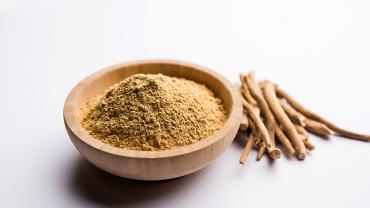
Ashwagandha (Withania somnifera) is a botanical that has been used medicinally for centuries in India, and in other parts of Asia and Africa. Its root contains more than 50 bioactive phytochemicals including alkaloids, steroidal lactones, withanone, withanolides, somniferine, and withanine. Ashwagandha is best-known as an adaptogen or a botanical that may help parts of the body adapt to stressors. Its species name is somnifera, which is Latin for “sleep-inducer.” Ashwagandha is gaining popularity in the scientific research community and evidence suggests that it has diverse actions supporting mood and brain health in the human body.
Studies show that ashwagandha may possess beneficial effects in the presence of stress, depression, anxiety, and other disorders of the brain. It works in part by modulating oxidative stress makers, including superoxide dismutase, catalase, lipid peroxidation, and glutathione. It may also contribute to neuronal regeneration through its influence on axonal and dendritic outgrowth. As an adaptogen, ashwagandha also influences processes in the hypothalamic-pituitary adrenal axis and the stress response through modulation of cortisol, nitric oxide, heat shock proteins, and stress-activated c-Jun N-terminal protein kinase. In animal studies, ashwagandha supported a healthy response to chronic stress, inhibited nerve cells from over-firing, and displayed gamma-aminobutyric acid–type activity, which indicates that ashwagandha may support mood in the presence of anxiety. Animal studies assessing the effects of ashwagandha and its bioactive constituents, glycowithanolides, showed improvement in symptoms in the presence of depression.
A randomized double-blind placebo-controlled clinical trial explored the effects of ashwagandha on healthy adults experiencing stress. A standardized daily dose of 240 mg of ashwagandha was given for 60 days. Data collection included symptoms of depression, anxiety, and stress using the Depression, Anxiety, Stress Scale-21 (DASS-21) and the Hamilton Anxiety Rating Scale (HAM-A) questionnaire and biomarkers such as cortisol and dehydroepiandrosterone sulfate (DHEA-S). The treatment arm experienced a statistically significant reduction of 23% in cortisol and a statistically significant reduction of 30% in HAM-A scores. Reductions in DASS-21 and DHEA-S were also observed.
A similar double-blind placebo-controlled study had three arms: a placebo, 250 mg per day of ashwagandha, and 600 mg per day of ashwagandha for 8 weeks. The study measurement tools included the Perceived Stress Scale (PSS-10), HAM-A, serum cortisol, sleep quality, and safety assessments. Significant improvements in PSS-10 scores, serum cortisol, and sleep quality were observed for both treatment arms. Significant improvement in HAM-A scores was observed in the 600 mg per day group, and in general, dose-dependent improvements were noted. Ashwagandha was well-tolerated and no adverse events were reported.
Although ashwagandha has many actions beyond those of brain support, it is a well-researched adaptogen that supports mood and a healthy stress response. Along with diet and lifestyle, supplementation with ashwagandha may be relatively safe and support normal brain function.
By Colleen Ambrose, ND, MAT